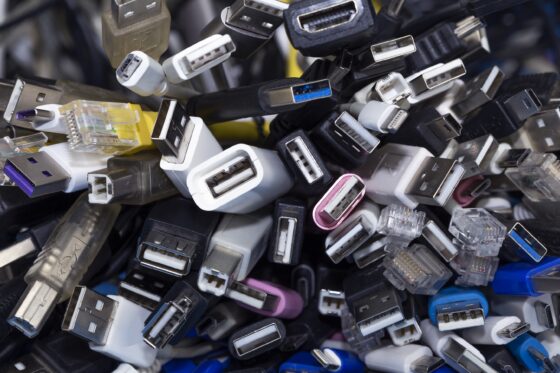
The end of incompatible chargers that cram loads? Under the agreement reached on Tuesday between member states and MEPs, the EU will impose a universal wired charger for smartphones, tablets, consoles and digital cameras from 2024, much to the chagrin of Apple, who opposed it.
By the fall of 2024, a range of rechargeable cabled devices – mobile phones, tablets, e-readers, headphones, digital cameras, portable video game consoles, portable speakers … – should be equipped with a USB port – C to be sold in the EU, regardless of manufacturer.
For laptops, the same requirement for a single charger will apply in the spring of 2026. The political agreement reached on Tuesday, after lengthy negotiations, will be formally approved after the summer by the European Parliament and the Council, the representative body of the states.
The text also paves the way for future standardization of wireless charging technologies, which are currently well underway.
“Consumers no longer need a different charger and cable every time they buy a new device, they can use one charger for all their small and medium-sized electronic devices”eliminating unnecessary accessories, explains Parliament.
The text states that the charging speed will be harmonized for devices that allow fast charging to avoid being limited when using a different brand charger. The labeling will be improved to better inform consumers, who can buy a device with or without a charger.
According to the European Commission, this regulation could save European consumers – who spend 2.4 billion euros a year on the purchase of chargers alone – at least 250 million euros. Unused magazine waste, estimated at 11,000 tons per year, could be reduced by nearly 1,000 tons.
Innovation “blocked”?
This project was launched by the Commission in 2009 but has been met with resistance from industry for some time.
However, the number of existing charger types has been greatly reduced over the years. From around 30 in 2009, they’ve gone down to three: the micro-USB connector that’s long been in most phones, USB-C, a more recent connector, and Apple’s Lightning charging technology.
The California group, which claims Lightning powers more than a billion devices worldwide, has consistently shown its opposition, believing the European text will “stifle innovation” and cut the EU off — depending on a choice of “obsolete” ones. standards – from the rest of the world.
By disqualifying some of the chargers and smartphones in circulation, Brussels “Manufacturers will incur significant losses, reduce consumer choice and generate electronic waste” additional, Apple insisted on Tuesday.
“Let’s be clear: if Apple wants to market its products (in Europe), we will have to respect our rules (…) We have to think about the environment”replied the Commissioner for the Internal Market, Thierry Breton.
“Preparing for the future†
“While charging systems locked consumers into a brand and forced us to collect cables at the expense of our wallets and natural resources, this is a staging post for the most recalcitrant”agrees MEP David Cormand (Greens).
His counterpart Geoffroy Didier (EPP, right) welcomes the “volunteer work” of the EU in the face of “improper waste dictated by the commercial interests of a few industrial groups”†
The ANEC association, which defends consumers’ rights over technological standards, welcomed “an agreement” that: “simplifies the jungle of options that have been imposed on consumers until now”†
ANEC regretted that the initial project did not cover wireless charging systems, but the final agreement includes provisions for setting a common standard in this niche, which is set to become the majority in the coming years.
The adopted text “prepare for the future (…) not to legislate on a technology that is already disappearing”assured MEP Alex Agius Saliba (S&D, Social Democrats), rapporteur for the text.
Thus, as wireless technology spreads, the Commission will be empowered to prepare “delegated acts on the interoperability of charging solutions”, ie regulations that can be directly applied without a vote in the Council or the European Parliament.
AFP